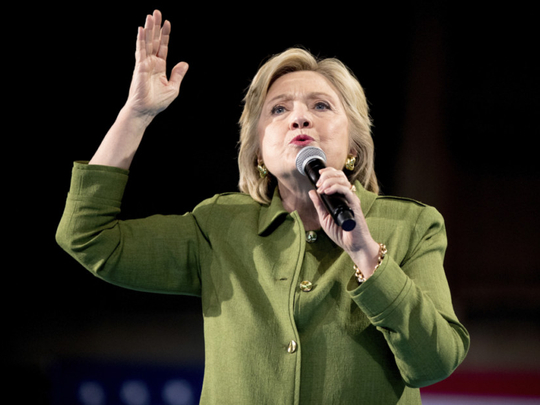
One candidate paraded his vice-president (VP) choices through Twitter and openly mused about their qualifications. The other kept her shortlist confidential and her opinions private. One had instant regrets about his decision. The other always seemed to be heading towards the same destination. One needed a safe pick to balance his own volatility. The other chose a safe pick because they are kindred souls in earnest wonkery.
Both in the manner of their selection and the content of their character, the VP picks of Donald Trump and Hillary Clinton open yet another chasm between the Republican and Democratic nominees. Don’t be fooled by appearances. Mike Pence and Tim Kaine may both look like mild-mannered establishment types who came straight out of central casting. And they may well be headed for the most tedious vice-presidential debate in recent history.
But there the similarities end. Kaine has a crossover appeal that has placed him at the forefront of the Democrats’ gains through what used to be conservative territory. First as Virginia governor and now as Senator, Kaine has demonstrated how Democrats can win in the southern states that have changed most rapidly in the last decade.
A former missionary, who is fluent in Spanish, Kaine says he is personally opposed to abortion but is a staunch supporter of a woman’s right to choose. As governor, he allowed 11 executions on his watch, yet earned the worst possible rating from the National Rifle Association. Pence, on the other hand, offers no such complexities that might allow him to reach across the aisle. The Indiana Governor is a movement conservative who signed into law a religious freedom bill, wants to see the end of abortion rights under Roe v Wade, and is backed by the Koch brothers’ conservative network.
Trump needed Pence to appease the base of his party with someone who spoke their own conservative language. If Hillary had needed to appease her own party base, she would have chosen Elizabeth Warren, the Massachusetts senator who most echoed Bernie Sanders, or Tom Perez, the labour secretary who would have been the first Latino on a major presidential ticket. Instead, the Kaine pick suggests Hillary believes she can reach into Republican states where the polls are already looking positive. In Virginia, Hillary is leading by high single-digit margins in the most recent polls. Next door in North Carolina, Hillary’s lead is within the margin of error but remains far above Barack Obama’s narrow margin of victory of less than 1 per cent in 2008.
Trump, on the other hand, still believes he can run a competitive race in New York and California, where he is trailing by 18 and 24 points, respectively. Republican strategists at last week’s convention in Cleveland sounded exasperated at Trump’s calculations, arguing that Hillary’s leads in key states were the result of heavy TV advertising that was going unmatched in states like Virginia and North Carolina. Pence will do nothing to rectify that delusional strategy and the appeal of a rock-ribbed Indiana conservative is limited to states Trump is already certain to win.
To be sure, Kaine has his own problems. He is the kind of politician that Trump likes to call low energy, although he can fire up a campaign crowd when he needs to. And it’s unclear how he can reach out to disappointed Sanders voters when he has been such a firm supporter of free trade. But Kaine also threatens to expose one of the most glaring weaknesses on the opposing ticket. He is fully up to speed on national security and international affairs, having served on Senate committees overseeing armed services and foreign relations.
Trump, on the other hand, does his best to give the impression that he has yet to pick up a book or briefing paper on either topic. Much of Kaine’s appeal rests on his ability to connect with all kinds of audiences: An appeal that speaks to his modest upbringing near Kansas City as the son of a welder. He is the ideal surrogate to park in the suburbs and small towns of the rust belt states.
For a politician who confesses he is boring, there are occasional bouts of reckless conduct. In 2008, Kaine was one of the first senators to break with the establishment and support Obama over one Hillary Clinton. For his part, Pence supported Ted Cruz in the primaries, but Trump was willing to set that aside, even as he remains determined to wage war against Cruz himself. “I don’t want his endorsement,” Trump sulked at his post-convention press conference on Friday, with Mike Pence at his side. “If he gives it, I won’t accept it.”
And there lies the biggest contrast of all between these two potential VPs. Hillary chose Kaine as a former Senate colleague with a similar temperament and worldview who could fit easily into her team inside the White House. Trump chose Pence as someone he’d never previously known, to represent everything he isn’t in temperament and worldview.
One is a grown-up pick; the other a knee-jerk decision. As pseudo-presidential decisions go, the VP selection process has been far more interesting than the VP picks themselves.
— Guardian News & Media Ltd
Richard Wolffe is a Guardian US columnist, as well as chief digital and marketing officer at Global Citizen, a non-profit organisation dedicated to ending extreme poverty. An MSNBC political analyst for a decade, Wolffe was most recently vice-president and executive editor of MSNBC.com and is the author of Renegade: The Making of a President, Revival: The Struggle for Survival Inside the Obama White House and The Message: The Re-Selling of President Obama. He had previously spent several years in senior roles at Newsweek magazine and the Financial Times.












